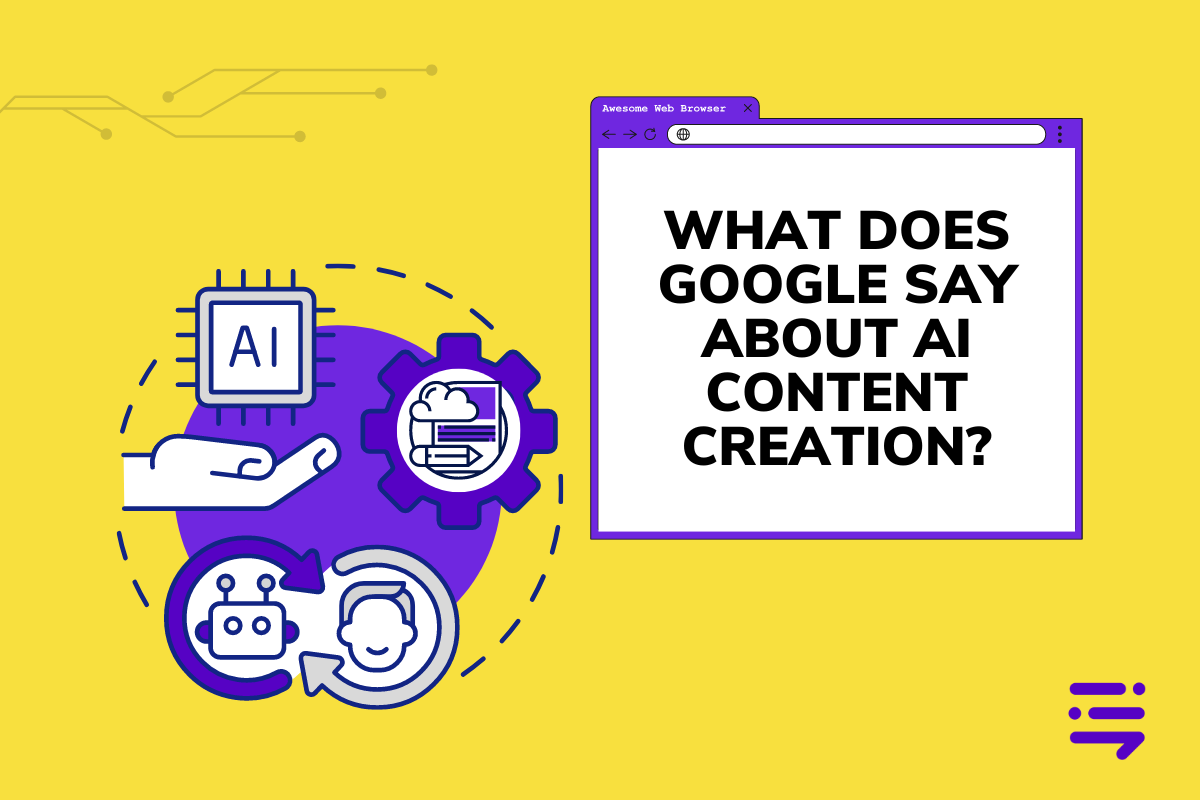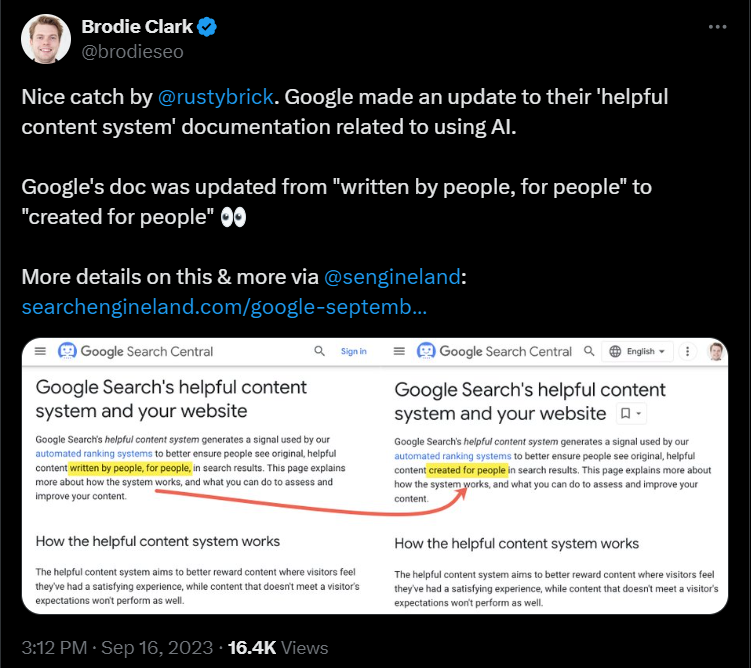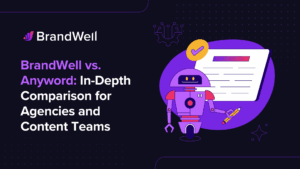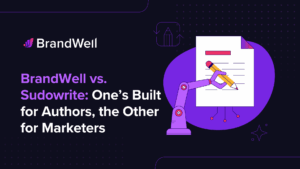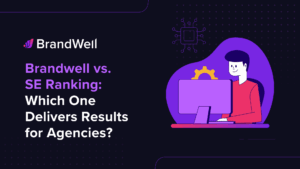AI is here, and with advances in generative models like ChatGPT, many content creators are wondering, what does Google say about AI content?
Google has a long history of cracking down on bad content, particularly those that are:
- Repetitive.
- Plagiarized.
- Unoriginal.
- Unhelpful.
- Written solely for search engines and not for people.
When asked about AI content, Google said content that’s generated automatically by AI writing tools goes against its guidelines. That was back in April 2022.
Six months later, Danny Sullivan clarified in a public tweet that AI content is not bad per se, but what Google doesn’t like is AI content that meets its criteria for bad content — plagiarized, unhelpful, and written only for ranking purposes.
That same October, Google updated its guidelines and added spammy to the section on automatically generated content, officially declaring that spam AI content violates its rules.
By February 2023, Google had totally embraced automation and updated its search guidelines with an entire section dedicated to AI content.
A month later, Google officially entered the AI market with the introduction of Google Bard.
In this blog post, we’ll break down how these recent changes in Google’s guidelines will impact your content, especially if you’re still on the fence about using an AI writing tool.
As a webmaster or content creator, you will learn:
- How to create high-quality helpful information while combating spammy rubbish generated by AI.
- How to meet Google’s E-E-A-T (expertise, experience, authoritativeness, trustworthiness) criteria for good content.
By understanding what Google says about AI content and following best practices, you can incorporate cutting-edge AI writing technology into your own work.
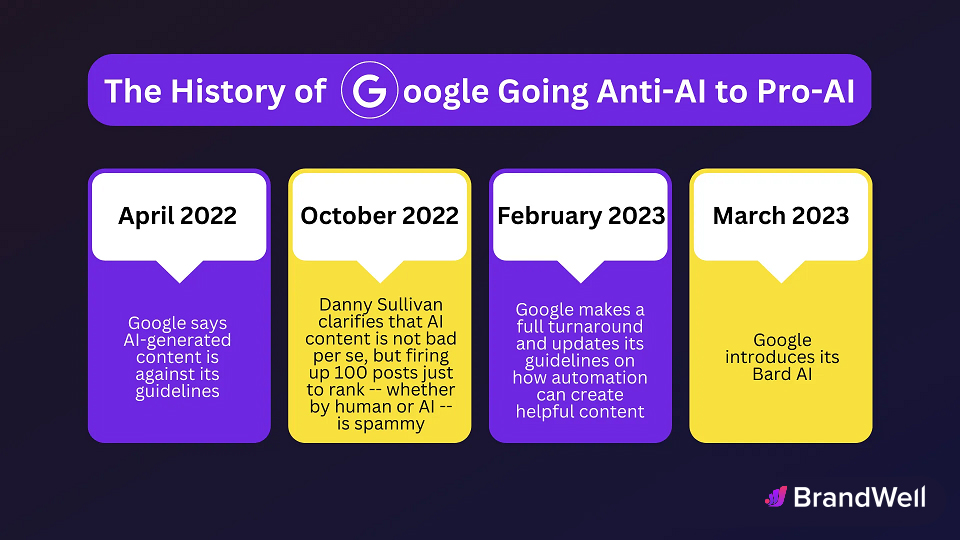
Google’s Stance on AI-Generated Content
In recent years, AI tools have become popular as a means to generate written content efficiently. With the rise of super smart tools like BrandWell and ChatGPT, content creators have found new ways to produce high-quality articles and blog posts with minimal effort.
However, there has been some confusion regarding Google’s guidelines on using this technology for creating content.
Revision of Google’s Previous Position on AI Content
In response to these concerns, Google recently revised its position on AI-generated content. The search giant now confirms that using AI-generated material is not against its guidelines, provided it maintains quality standards and does not manipulate search rankings maliciously.
This change in stance allows creators to harness the power of tools like BrandWell to generate helpful content without fear of violating any rules.
Here’s the full announcement from Google as published on its Google Search Central blog last February 8, 2023:
“Google’s ranking systems aim to reward original, high-quality content that demonstrates qualities of E-E-A-T: expertise, experience, authoritativeness, and trustworthiness.
Our focus on the quality of content, rather than how content is produced, is a useful guide that has helped us deliver reliable, high-quality results to users for years.
When it comes to automatically generated content, our guidance has been consistent for years. Using automation—including AI—to generate content with the primary purpose of manipulating ranking in search results is a violation of our spam policies.
Google has many years of experience dealing with automation being used in an attempt to game search results. Our spam-fighting efforts — including our SpamBrain system — will continue however spam is produced.
This said, it’s important to recognize that not all use of automation, including AI generation, is spam.
Automation has long been used to generate helpful content, such as sports scores, weather forecasts, and transcripts. AI has the ability to power new levels of expression and creativity and to serve as a critical tool to help people create great content for the web.
However the content is produced, those seeking success in Google Search should be looking to produce original, high-quality, people-first content demonstrating E-E-A-T qualities.
Using AI doesn’t give content any special gains. It’s just content. If it is useful, helpful, original, and satisfies aspects of E-E-A-T, it might do well in Search. If it doesn’t, it might not.“
What is Google E-E-A-T?
Google E-E-A-T stands for Experience, Expertise, Authoritativeness, and Trustworthiness. It is a concept used by Google to evaluate the quality and credibility of web pages and websites, as outlined in their Search Quality Evaluator Guidelines.
E-E-A-T is an important factor in determining search engine rankings and ensuring that users receive reliable and authoritative information.
If you want your blog or website to rank, then E-E-A-T should be at the core of your content creation strategy.
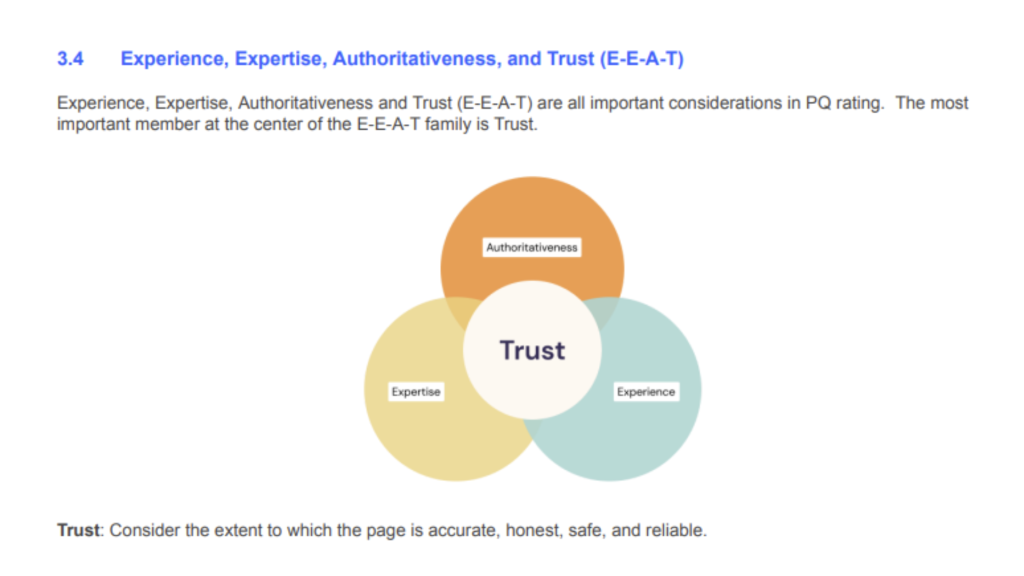
Here’s a brief overview of each component of E-E-A-T:
Experience
Trust comes from experience. What is the extent of your first-hand or life experience on a particular topic?
Web pages are trustworthy and achieve their purpose well when created by people with a wealth of personal experience.
For example, would a customer trust a product review from someone who has personally used the product or a “review” by someone who has not?
Having significant experience lends itself to trust.
Expertise
This refers to your knowledge and expertise in the subject.
Google looks for high-quality content that demonstrates a high level of expertise in the topic.
You should have the necessary qualifications, experience, or credentials to be considered an expert in your field.
Authoritativeness
Authoritativeness refers to the reputation and authority of your website.
Google considers signals such as backlinks from other reputable websites, mentions by authoritative sources, and positive user feedback to determine the authority of a website.
Which websites are citing you? Does your byline appear elsewhere on the web?
Trustworthiness
Google considers trust as the “most important member of the E-E-A-T family.”
Trustworthiness relates to the reliability and credibility of your content.
Your website should provide accurate, reliable, and trustworthy information.
Factors such as transparent and accurate information about the owners of your website, contact information, privacy policies, and security measures contribute to establishing trustworthiness.
According to Google:
“Trust is the most important member of the E-E-A-T family because untrustworthy pages have low E-E-A-T no matter how Experienced, Expert, or Authoritative they may seem. Trust is the mechanism by which raters determine if the page is accurate, honest, safe, and reliable.”
If the E-E-A-T of a page is low, people cannot or should not use that content. Google will consider it untrustworthy and rate it the lowest.
Google aims to prioritize high-quality content that meets these E-E-A-T criteria in its search results, particularly for topics that significantly impact users’ well-being, such as medical advice, financial information, legal topics, and news.
By evaluating E-E-A-T, Google aims to deliver reliable and trustworthy information to its users.
This means your expertise and reputation now matter more than ever.
What are examples of low E-E-A-T pages?
- The content creator lacks adequate experience: a restaurant review written by someone who has never eaten at that restaurant.
- The content creator lacks adequate expertise: an article about how to skydive that’s written by someone with no expertise in skydiving.
- The content creator is not an authoritative source: tax form downloads on a cooking website.
- The content creator is not trustworthy: a shopping page with minimal customer service information.
What about high E-E-A-T?
Pages with high E-E-A-T are trustworthy or very trustworthy.
Experience is valuable for almost any topic.
A good example of high-quality content is a social media post or forum discussion. These places often involve people sharing their personal experiences. For example, authors writing symphonies or consumers reviewing home appliances.
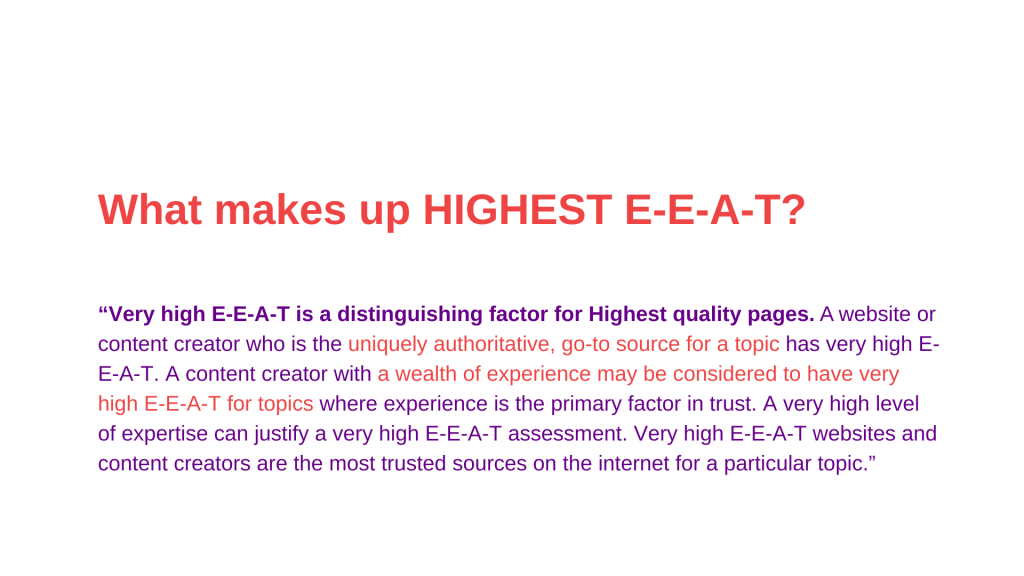


So why should you E-E-A-T?
This latest Google update tells us what Google is looking for in terms of content quality. By following E-E-A-T guidelines, it’s easier for your website to appear in Google search results and avoid being penalized by future algorithm updates.
September 2023 Update: Content Written for People, Not By People
On September 2023, Google once again updated its helpful content guidelines by removing “written by people” which demonstrates its full acceptance of AI-generated content.
This notable pivot in Google’s approach to AI-generated content provides marketers and SEOs with a clearer perspective — and greater confidence — when trying to rank for a keyword using AI content.
What seems like a minor change has an enormous impact that indirectly signals Google’s endorsement of AI-generated content that delivers value and prioritizes user experience.
Instead of focusing on who/what created the content, Google emphasizes the importance of “helpful content created for people” in its search results.
March 2024 Update: Google is Cutting Spam Content by 40%
On March 9, 2024, Google announced a major update to its ranking system and spam policies.
In a nutshell:
- Google will remove up to 40% of low-quality, unoriginal, unhelpful content from its index.
- Google’s new anti-spam policies will specifically target abuses of scaled content, site reputation, and expired domains.
What does this mean for content creators? Did Google just kill AI content?
Not at all.
The crackdown on scaled spammy content simply reinforces the September update where Google changed its definition of helpful content from “written by people for people” to “content created for people”.
Google is simply cleaning house and removing low-quality content that’s mass-produced to manipulate SERP rankings.
In the days following the rollout of the March 2024 core update, social media was abuzz with marketers/publishers talking about entire networks of websites gone kaput!
The implementation was fast and hard, with even the most established sites getting completely deindexed from Google.
From our own analysis, these are the types of content that Google is going after:
- Mass detectable content
- Articles that don’t give a clear, straight answer to the search term
- Link farms
- Guest post websites
- Websites with poor UX
- Websites with lots of ads
So, can you still use AI to publish content?
Definitely!
But be wary of these triggers. If you are publishing 100+ posts per day, your website is easy to flag for a manual review.
And as always, focus on E-E-A-T and create content that answers questions or solves problems for real people.
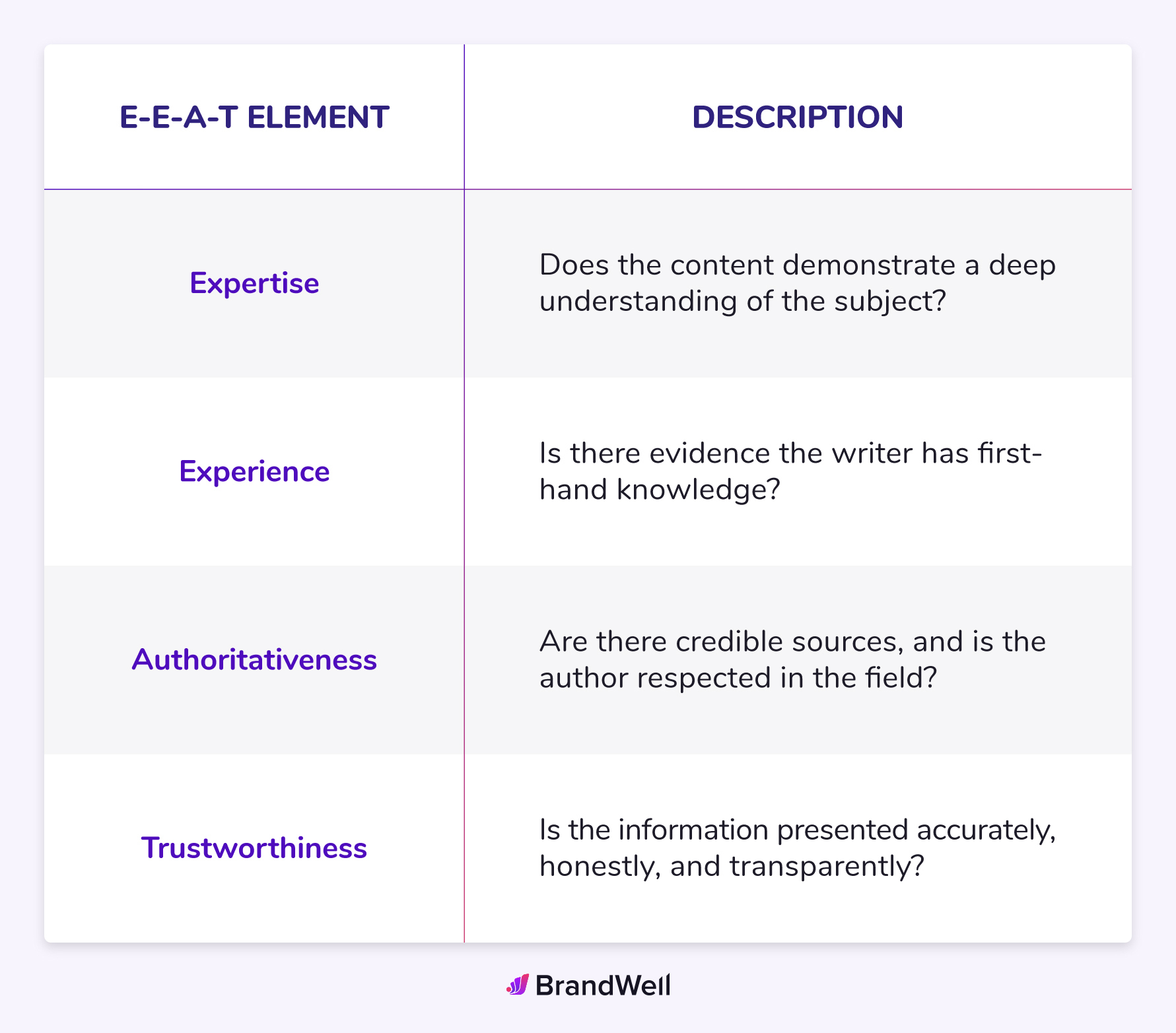

How to Generate AI Content That Meets Google’s Requirements
The primary goal behind this revision is to ensure that people create great content, even with the help of AI. By allowing the responsible use of AI technologies, Google continues to stay committed to providing helpful information through search results.
Three things you should keep in mind when using AI writing tools:
- Maintain quality standards: Creators must ensure that AI content meets Google’s quality requirements by properly editing drafts before publishing them online.
- Avoid malicious manipulation: Do not use AI for spamming purposes or manipulating search engine rankings.
- Focus on people-first content: The use of AI-generated content should prioritize the needs and interests of users, helping them find answers to their questions or solutions to their problems.
Guidelines for Transparency
As AI-generated content grows, it is critical to maintain transparency and trust between content creators and users. Google recognizes this need and has updated its help page with guidelines focusing on Who, How, and Why in relation to how content is produced.
To establish credibility in the eyes of both users and search engines, Google advises including an author byline when publishing AI-generated content. This helps convey expertise while giving credit where it’s due.
Providing background information about authors – whether human or AI – also enhances transparency.
For instance, if you are using BrandWell as your primary writing tool, consider mentioning this fact alongside the author’s name.
Maintaining transparency not only fosters trust with your audience but also aligns with Google’s guidelines for high-quality, people-first content.
It’s Time to Embrace Automation
Now that we know Google is fine with AI content, it’s time to go all in.
What better way to do that than with BrandWell? Our AI writing machine allows you to create long-form blog posts within minutes instead of hours!
How easy is it to use BrandWell? You can produce hundreds of blog posts in just three steps:
- Add keywords, YouTube URL, podcast, or custom audio file.
- Click the Create Content Now button.
- Get long-form articles (2,600 words on average) that are original, well-researched, humanlike, fully optimized for SEO, and plagiarism-free.
With BrandWell, you can save 10x the time and scale content by 25x!
Worried about copyright? Read our policy on passing down AI copyright to you, the human optimizer.
FAQs – What Does Google Say About AI Content?
How does Google rank AI content?
Google ranks AI-generated content based on its quality, relevance, and adherence to SEO best practices. The search engine’s algorithms evaluate factors such as keyword usage, readability, user engagement metrics, and backlinks. High-quality AI-generated content that meets these criteria can perform well in search rankings.
Can Google tell AI content?
Google is constantly improving its ability to detect AI-generated content through advanced machine-learning techniques. An AI detector tool will make sure your content is fully written by a human. But in the end, detection won’t really matter as long as you meet Google’s EEAT criteria to generate helpful content.
Does Google like AI-generated content?
Google appreciates high-quality and relevant content regardless of whether it’s written by humans or generated by artificial intelligence. As long as the AI-produced material offers value to users while following Google Webmaster Guidelines, it will be considered favorably in search rankings.
Ready to Jump on the AI Bandwagon?
Google has gone from anti-AI to pro-AI in just nine months — fully embracing automation as a tool to help human writers produce high-quality, people-first content.
With Google’s stance shifting, AI detection could matter less in the future.
Google has made one thing clear: it’s okay to use AI as long as you don’t abuse it for the rankings.
BrandWell is already producing over 50 million words per month and growing! Jump in and see how easy it is to scale your brand growth efforts: Get Started!

